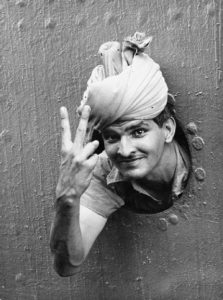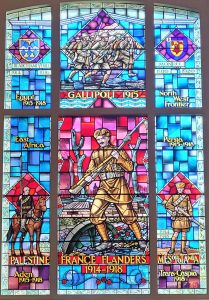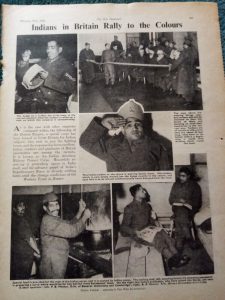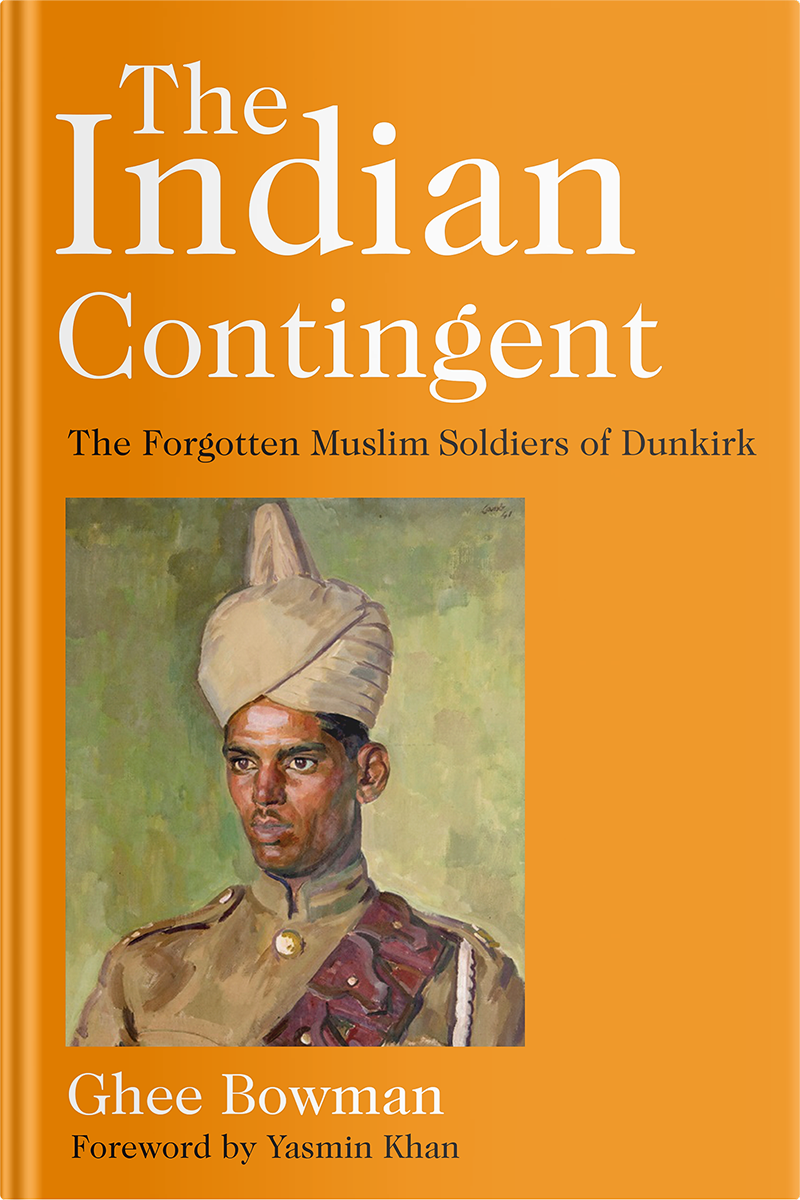Did you have a grandfather in the Indian Army during the Second World War? Would you like to find out more about what they did?

This post has been written on the basis of my experience researching the Indian Army, with input from other researchers. It is designed to help you in your research. It was inspired partly by Mobeen Azhar’s documentary The Soldiers that saved Britain.
I welcome your feedback on this post, and indications of what I’ve missed, to info@forcek6.org.uk
+++++
When I say ‘Indian’ within this post, I’m generally referring to pre-partition India: what we would now call South Asia, including territory that is now Pakistan and Bangladesh.
So the term ‘Indian Army’ refers to troops recruited in India, used to support the British Empire before 1947. It is therefore distinct from the ‘Indian National Army’ of Subhash Chandra Bose, who fought against the British in Burma. It is also separate from the post-47 Indian Army.
If your relative was in the Indian National Army (INA) in Asia, or the Legion Freies Indien/950 regiment in Europe (in both cases often referred to as the Azad Hind Fauj in South Asia) then do still use this guide. Their records would still be with their original regiment. Half the INA veterans were dishonourably discharged in 1945/6 and their records in regiment would reflect their service till 1942, captivity/ INA 1942-5 and then discharge. The other half were allowed back into the Indian Army and their records would be available.
The Indian Army and the British Army
From the time of the East India Company, the British military presence in India involved both European and local troops.
Over three centuries, many white British troops served in India as part of the British Army, fighting against Indians, Afghans and others, and also serving alongside Indian troops.
The term ‘Indian Army’ refers to troops recruited in India, whether used locally or outside India. Until the Great War, all the officers of the Indian Army were white British men. From 1919, the process of ‘indianisation’ began, whereby Indian men were trained to be officers.
Some of this training happened at Sandhurst in the 1920s and 30s. There is an Indian Army memorial window there, reminding us that vast majority of Indian Army officers trained there.

There were also other white men – non-officers – in the Indian Army, for example ‘sub-conductors’ in the RIASC.
There was also something of a tradition of British NCOs going from the British Army to the Indian Army.
During the Second World War, Indian and British Infantry troops were brigaded together, with one British and two Indian battalions. For example, the 5th Indian Infantry Brigade in North Africa included the 3rd bn, Punjab Regt, 4th bn, 6th Rajputs and 1st Bn, Royal Fusiliers.
During the Second World War, there were also some Indians in the British Army. Apart from a few officers (for example Lalkaka in the Wiltshires, Mazumdar in the RAMC and Inderjit Singh Gill in the Engineers), the most notable group was the 80th Company of the Pioneer Corps, whose job was manual labour and light engineering. The 80th Company was recruited from Indians resident in Britain, mostly lascars, mostly Muslims. They were never a full-strength unit, peaking at 172 Indians. They were used for construction work throughout the UK, including London and Devon, and were frequently photographed and filmed.

Men of the 80th Company of the Pioneer Corps, from an article in ‘The War Illustrated’ (Delhi)
Where are the records
Until 1947, records relating to the Indian Army could be found in London, at the India Office and the War Office (WO), and in India. At partition and Independence, the records became more difficult to find.
All the War Office records were deposited at The National Archives in Kew (TNA). There you can find unit diaries for the Second World War and many other papers.
The India Office Records (IOR) ended up in the British Library in London.
Papers in Delhi and elsewhere in India were divided and spread around, some going to Pakistan but most staying with the Adjutant General Branch in Delhi.
Some were transferred to the Indian National Archives (INA) in Delhi. The Library at the United Services Institute (USI) also received many files.
Regimental centres and Museums in South Asia sometimes have personal records or mentions.
Generally, the search for documents can be long and frustrating, whether in South Asia or elsewhere. This is a result of the nature of colonial record-keeping as well as British India’s independence two years after the end of the war, and the trauma of Partition.
Where to start
As with all family history, start with what you have:
- Talk to relatives – maybe record an audio interview with them
- Look for documents, medals, photos letters among family members
- Take high quality photos of all documents that you find
Essential information you’ll need
It will be much easier to find further information if you can find these essentials first:
- Your relative’s name, remembering that it may be spelt different ways in different documents, for example Mohammad, Muhammed, Mhd..
- His Regiment, Corps or unit
- Service number
- Ranks reached
- Where he served
Books: General
There are many books that cover the topic. Perhaps the best places to start are:
Khan, Yasmin, The Raj at War: A People’s History of India’s Second World War (London: Bodley Head, 2015)
Gupta, Diya, India in the Second World War: An Emotional History (London: Hurst, 2023)
Jackson, Ashley, The British Empire and the Second World War (London: Bloomsbury, 2006)
Karnad, Raghu, Farthest Field: An Indian Story of the Second World War (Noida, Uttar Pradesh: William Collins, 2015)
Mason, Philip, A matter of Honour: An account of the Indian Army, its officers and men (London, 1974 Jonathan Cape)
Raghavan, Srinath, India’s War: The Making of Modern South Asia, 1939-1945 (London: Penguin, 2016)
Visram, Rozina, Asians in Britain: 400 Years of History (London: Pluto, 2002)
Gajendra Singh The Testimonies of Indian Soldiers in the Two World Wars – Between Self and Sepoy (Bloomsbury Academic 2014)
Official history of the Indian armed forces in the second world war 1939-45 (1950, reprinted 2012 Pentagon)
Regimental Histories
Most regiments and corps of the Indian Army have a book about them. These can be found at the Imperial War Museum, The USI in Delhi, or by searching WorldCat https://search.worldcat.org/
These are some of the regimental histories I’ve consulted
A History of the Royal Bombay Sappers and Miners, 1939 to 1947, 1999
Abhyankar, MG, Valour Enshrined a History of the Maratha Light Infantry 1768-1947 (New Delhi: Orient Longman, 1971)
Ahmed, Rafiuddin, History of the Baluch Regt, 1939-1956 (Abbotabad: Baloch Regimental Centre, 1998)
Barr, James, A Brief History of the Mahratta Light Infantry (Bombay: Claridge, 1945)
Bhalla, J.S., History of the Remount and Veterinary Corps 1794-1987 (New Delhi: Additional Directorate General, Remount and Veterinary, Quartermaster General’s Branch, Army Headquarters, 1988)
Cross, JP, and Buddhiman Gurung, Gurkhas at War. In Their Own Words: The Gurkha Experience 1939 to the Present (London: Greenhill, 2002)
Deedes, Ralph B, Historical Record of the Royal Garhwal Rifles Volume II: 1923-1947 (Lansdowne: Garhwal Regimental Centre, 1995)
Dhillon, AIS, The Garhwalis: The Garhwal Rifles Regimental Officers Handbook, 2nd edn (Lansdowne: Garhwal Regimental Centre, 2008)
Filose, AA, King George V’s Own Central Indian Horse (Edinburgh: Blackwood, 1950), II
Lindsell, RA, A Short History of Queen Victoria’s Own Madras Sappers and Miners during World War II, 1939-1945 (Bangalore: Hosali, 1950)
Gould, Tony, Imperial Warriors: Britain and the Gurkhas (London: Granta, 2000)
Mackay, JN, A History of 4th Prince of Wales’s Own Gurkha Rifles Volume III 1938-1948 (Edinburgh: Blackwood, 1952)
Palit, D.K., History of the Regiment of Artillery, Indian Army (London: Leo Cooper, 1972)
Pearson, Brief History of the K.G.V’s Own Bengal Sappers and Miners Group, R.I.E. (Roorkee, 1947)
Vaughan, A History of the 2nd Royal Lancers (Gardner’s Horse): From 1922-1947 (London: Sifton Praed, 1951)
Virk, D.S., Indian Army Post Offices in the Second World War (New Delhi: The Army Postal Service Association, 1982)
Navy and Air Force
As well as the Army, Indians also served in the Merchant Navy, the RAF, the Royal Indian Navy and the IAF.
One useful book on Merchant navy:
Stockbridge, Ian, Book of Remembrance: The Merchant Navy World War Two (London: Numast, 2003)
Memoirs
There are many memoirs of individual soldiers – mostly officers. They can be found at NMML in Delhi, and some of them at the British Library in London. These are a few suggestions from Ghee Bowman and Gautam Hazarika:
Crasta, John Baptist Eaten by The Japanese (Invisible Man Books 1998).
Dhillon, Gurbakhsh Singh, From My Bones (New Delhi: Aryan Books International, 1998)
Issar, Satish K., General SM Shrinagesh (New Delhi: Natraj, 2009)
Khan, S.N. (1946) The first trial of I.N.A. officers and its aftermath. Lahore
Kiani, Mohammad Zaman India’s Freedom Struggle and the Great INA
Naravane, AS, A Soldier’s Life in War and Peace (Delhi: APH Publishing Corporation, 2004)
Parab, Gangaram S., edited by Aruna and Shivaji Seth A daring journey to freedom– escape from a Japanese prisoner-of-war camp:
Parmar, Narender Singh, Chint Singh The Man Who Should Have Died (2021).
Pillai MM Three Thousand Miles to Freedom (Lancer Publications 2009).
Safrani, A.H. (1995) The men from Imphal.
Singh Gurbaksh Indelible Reminiscences (Lancer Publications 2013)
Singh, Jasbir Escape from Singapore (Lancer Publications 2010).
Singh, Harbakhsh, In the Line of Duty: A Soldier Remembers (New Delhi: Lancer, 2000)
Singh, Mohan Soldiers Contribution to Indian Independence,(Army Education Service 1974)
Sundar, CR, General PP Kumaramangalam: His Life and Times (Chennai: Sundar, 2018)
The Forgotten Army, India’s Armed Struggle for Independence 1942-45, Peter Ward Fay, The University of Michigan Press 1991. https://archive.org/details/forgottenarmyind00pete/page/108/mode/2up
Naranjan Singh Gill Story of the INA (1985) https://archive.org/details/storyofina00colo
Thimayya https://archive.org/details/thimayyaofindias00evan
Shahnawaz Khan https://archive.org/details/inaanditsnetajishahnawazkhan_392_e
Medal Records
Awards of medals were recorded in the London Gazette, searchable online
https://www.thegazette.co.uk/all-notices/content/116
Gallantry medals are also at TNA in series WO 373
https://discovery.nationalarchives.gov.uk/results/r?_q=WO+373&_sd=&_ed=&_hb=
Talwar, Sushil, Indian Recipients of the Military Medal (New Delhi: KW Publishers, 2017)
Newspapers
British newspaper archive https://www.britishnewspaperarchive.co.uk
Times of India https://www.britishnewspaperarchive.co.uk/titles/times-of-india
Fauji Akhbar was the Army newspaper. You can find it at IWM and NAI
Websites: general
Interesting website that covers Britain and commonwealth soldiers
https://www.britishmilitaryhistory.co.uk/documents/
India Ministry of Culture Archives
https://indianculture.gov.in/freedom-archive/archival-records
Databases
I have developed two databases from my work. For Force K6 (RIASC Indians soldiers in France & Britain), go to
https://www.forcek6.org.uk/search-the-ranks
I also have a database of over 12,000 Indian POWs held in Europe. At the moment that is not online.
The UK Punjabi Heritage Association have digitised records from the Great War
Your relative may be buried in a Commonwealth War Grave. The website of the Commonwealth War Graves Commission has a good search function
If your relative was born or died in the UK, they may show up on standard genealogy sites such as
District Soldier Boards. Each district of post-47 India has a local board responsible for the welfare of veterans. If you google Zila Sainik Board with the name of your relative’s home district, you may or may not get a good response.
If they served in Far East in WW2, check FEPOW sites (largely British or Australian, but with some info on Indian Army
- https://www.fepow.family/
- https://www.cofepow.org.uk/
- https://www.malayanvolunteersgroup.org.uk
- https://fepowhistory.wordpress.com
If they were in Singapore and survived World War II, check
- Names of 1512 interrogation subjects by CSDIC (I) in Singapore https://www.abhilekh-patal.in/jspui/handle/123456789/2821983
- Names of INA men shipped from SINGAPORE to India (Jan/Mar/May 1946) https://www.abhilekh-patal.in/jspui/handle/123456789/2821005?searchWord=160&backquery=%5blocation=123456789%2F2818664&query=160&rpp=20&sort_by=dc.date.accessioned_dt&order=desc&originalquery=
Officers
If your relative was an officer (white or Indian) or a Viceroy’s Commissioned Officer, then you can find him in the Indian Army lists. These were compiled at least once a year, listing officers by regiment and alphabetically.
You can find these at the India Office Records at the British Library in London, the Imperial War Museum and the Centre for Armed Forces Historical Research at the United Service Institution of India, Delhi.
The service records of many officers, white and Indian, are kept at the IOR at the British Library in the series L/MIL/14 – records of service of officers, usually on microfilm. Unfortunately these are difficult to access following a cyber attack in 2024
Archives: General
This ‘Rookies Guide’ to archives is useful
https://www.malayanvolunteersgroup.org.uk/uploads/1/0/7/3/107387685/rfhg_rookie_archive_guide.pdf
Archives: UK
The Imperial War Museum (IWM) in London has many resources, including Photos and film footage. You can search their collections here:
https://www.iwm.org.uk/collections
The National Archives (TNA) at Kew, London hold many records, including war diaries for individual units. You can search their catalogue online
https://discovery.nationalarchives.gov.uk/
National Army Museum (NAM) in London has some interesting photos, diaries and all sorts of things. They will scan documents (for a fee). You can search the collections online
https://www.nam.ac.uk/collections/how-research-our-collections
Archives: Switzerland
If your relative became a POW, you may find him in the Photo Archives of the International Committee of the Red Cross (ICRC), Geneva
https://blogs.icrc.org/cross-files/category/audiovisual/photo/
Archives: Germany
If your relative joined the Indian Legion – part of the German army – you may find records in the German Bundesarchiv. Here’s a photo search
https://www.bild.bundesarchiv.de/dba/en/search/?yearfrom=1940&yearto=1946&query=indische&page=1
Archives: India
Centre for Armed Forces Historical Research at the United Service Institution of India, Delhi
https://www.usiofindia.org/library/services.html
National Archives of India, New Delhi. Their online portal can be quite good https://www.abhilekh-patal.in/jspui/
Nehru Memorial Museum & Library, Delhi is good for private papers and books
http://pmml.nic.in/welcomeToNMML
Archives: Pakistan
I had little luck with archives in Pakistan. This article is interesting
http://dissertationreviews.org/three-archives-in-pakistan/
National Archive, Islamabad
Had some useful stuff
National Documentation Centre, Islamabad
Holds copies of material from IOR in London
http://ndw.gov.pk/Contact_Us.htm
Pakistan Army Museum, Rawalpindi
Very useful
Punjab Archives
Punjab Archives Department, Lahore
http://dap.itu.edu.pk/archives/
The Indian Military Historical Society
This society closed down in 2020. They were very active and useful, and had an excellent journal called ‘Durbar’. Their website was merged into this, where you can also see Durbar:
https://www.militaryhistoricalsociety.co.uk/
Facebook groups
There are many relevant groups on facebook. Members are often very helpful.
South Asian Military Heritage Group
https://www.facebook.com/groups/258972031215184/
Indian Armies of WW2
https://www.facebook.com/groups/827799843921097
Indian Army of the Great War
https://www.facebook.com/groups/385893498257028
Madras Sappers & Miners
https://www.facebook.com/groups/323899511298134
Malayan Volunteers
https://www.facebook.com/groups/375356659604268
Far East POWs (FEPOW)
https://www.facebook.com/groups/13965904326
FEPOW family
https://www.facebook.com/groups/FEPOW.Family
Sikh Military History
https://www.facebook.com/groups/sikhmilitaryhistoryforum
Sikh Community UK
https://www.facebook.com/alittlehistoryofthesikhs/
Scholars & researchers who may be able to help
I hope to add more names in due course
Ghee Bowman, specialising in Indian troops in UK and POWs in Europe, based in UK
Derek Law, specialising in Indian seamen (both lascars & RIN), based in UK
Gautam Hazarika , specialising in Far East POWs, Indian Army, Allied POWs and Civilian Internees in WWII Far East, based in Singapore
Omer Tarin, specialising in records in Pakistan, based in Pakistan
Diya Gupta, based in London, with considerable experience in archives in the UK and India
+++++
I welcome your feedback on this post.


